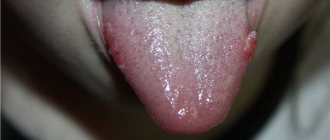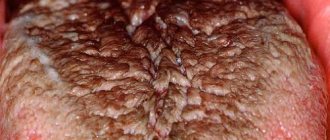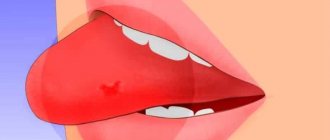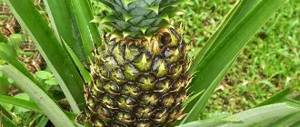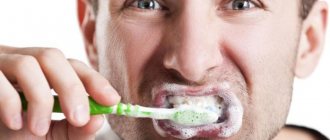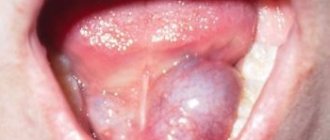Basically, many diseases in the oral cavity occur due to the influence of harmful bacteria, but problems of a different nature often occur, and they arise unexpectedly, for example, when a person bites his tongue. Lesions can be very different - a minor injury while eating or a serious soft tissue injury caused by a fall or blow. When the tongue gets under teeth, which are known to be very hard, even through-and-through damage can occur.
The tongue is one of the most powerful muscles of the body. Every day he is under a lot of pressure. It contains a large number of blood vessels, which is why any injury can pose a serious danger. Particularly large bleeding occurs when the lower part of the tongue is bitten, and also when the injury is severe. But at the same time, even a slight bite often causes very noticeable pain. And it can be injured from different sides: from below, from the side, etc. Therefore, if you notice a wound that is bleeding even a little, you need to take action.
Despite the fact that the mucous membrane has the ability to quickly recover, quick and skillful treatment procedures in such situations are simply necessary to prevent negative consequences. Even if there is almost no blood, an ulcer may subsequently appear, which will fester, be very painful and take a long time to heal. It is advisable to provide assistance immediately. A small bite sometimes takes just one day to heal, but a more complex injury may take a week.
To properly figure out what to do in this case, what medications to use to relieve inflammation, you should consult a dentist. Moreover, you should see this specialist or an orthodontist if there are repeated bites of the tongue, perhaps the reason lies in dental problems.
Why do we bite our tongue?
It is impossible to determine exactly why this happens. However, there are several factors that serve as sources of this unpleasant incident. Initially, ask yourself the question: “Why do I bite my tongue?”
The reasons for this phenomenon may be the following:
- conversation sometimes food;
- haste, resulting in uncontrolled and rapid chewing of food;
- concentration on a specific problem, and eating fades into the background;
- incorrect structure of the teeth (their unevenness can become a source of tongue biting);
- uneven bite or poorly installed denture.
Most often, these are the reasons that underlie tongue trauma. However, a combination of several factors cannot be ruled out.
How to eliminate and prevent biting your tongue while sleeping?
The best way to prevent inner-oral biting is to identify and treat the cause. In most cases, isolated involuntary biting is not considered a medical problem, but doctors still often hear from patients the question “why do I bite my tongue in my sleep?”
If the cause of involuntary jaw movements is any disease, then all efforts should be directed towards proper treatment.
If the cause of involuntary jaw movements is any disease, then all efforts should be directed towards proper treatment. If the doctor has not identified real deviations in the patient’s general health, then it is necessary to visit a psychotherapist. Cognitive behavioral therapy will also help those people who suffer from apnea and bruxism. You can do relaxing asanas on your own, listen to soothing music and drink a cup of mint tea before going to bed. This will help reduce the risk of involuntary jaw movement. Although biting your tongue during the night can be irritating and very painful, there is no need to worry about it. In most cases, this does not indicate serious health problems, but an unstable state of the nervous system.
Causes of childhood injuries
If an adult bites his tongue, he experiences extremely unpleasant sensations. For a child, such a situation is equal to disaster. Children immediately begin to react to the incident, tears and discontent appear. In addition, the baby may be very frightened when he sees blood gushing out of the mouth.
If a child bites his tongue, what to do in such a situation? The most important thing is not to panic. It is necessary to resort to a number of measures, which will be discussed further, as complications may arise.
First, let's look at the main causes of injury:
- a fall;
- blow to the face;
- carelessness during the game;
- excessive inattention while eating.
First aid
Now let's consider, if a person bites his tongue, what to do first. After an injury, a bleeding wound remains. It requires increased attention. You should start by neutralizing the pain from the bite and stopping the bleeding.
An adult can resort to the following activity. In order to instantly stop the bleeding, you need to rinse your mouth with cold water several times. Low temperature promotes vasoconstriction. This stops the bleeding.
If the child refuses to rinse his mouth with water or is too small for such a procedure, then a clean handkerchief can be used. It is necessary to apply it to the wound. The fabric will block the access of saliva to the injured surface. As a result, the bleeding will stop faster.
Treatment
Sometimes biting your tongue can cause a lump. In this case, you need to show her to a doctor. Well, for first aid you need to use one of the means that were previously described.
When injured, the tongue can become quite painful. If the adult continues to suffer, then this pain will cause a lot of problems for the child and his parents. If the baby experiences pain that does not go away, or a wound or ulcer has appeared, then you need to show him to the doctor as soon as possible.
You can apply ice to relieve some pain and reduce swelling. Well, if it is prepared from a decoction or solution of chamomile, sage, calendula. Ice is placed in a bag, wrapped in a clean cloth and applied as a compress to the injury site. For it to help, you need to hold the ice for 10-15 minutes.
If the injury is deep, take your child to the doctor.
If you have aloe at home that is older than two years, you can use its juice. It quickly heals wounds and disinfects them. Just cut off the leaf, wash it and apply the cut to the wound. Aloe juice is used in compresses.
Sores in the mouth can be treated well with regular baking soda or salt. They can be mixed and prepared as a solution, or they can be diluted in water separately (a teaspoon of the product per glass of water). You can make a compress with this solution, or you can rinse your mouth.
In case of severe injuries, it is important to support the immune system. It is important that the body quickly regains its strength. It must resist inflammation and general infection. For this purpose, vitamins and immunomodulators are prescribed. The menu should include a lot of fiber products. It is important to saturate the body with microelements.
A doctor's help is needed in the following cases:
- Where the wound formed, a strong swelling and hematoma appeared.
- It took half an hour to stop the bleeding.
- Part of the tongue was completely bitten off.
- The tissues are bitten through.
- The wound is long, deep, and has uneven edges that cannot be aligned.
- The wound is larger than 5 mm and bleeds quite heavily.
- Over time, the pain does not subside and swelling appears.
Traditional medicine will speed up healing.
Often in such cases the question arises: “Which doctor is best to contact?” If the wound is fresh, you need to go to a traumatologist. But a pediatrician will help you cope with prolonged wounds or ulcers. If the injury is serious, a surgeon may be needed.
Sedatives
You can do things a little differently if your baby bites his tongue hard. What to do when your baby goes into hysterics as a result of severe pain?
In order to calm the child, you need to moisten a cotton swab in the lidocaine solution. Antiseptic drops will also help relieve pain.
However, you need to monitor the amount of product applied. Do not wet the cotton wool too much, otherwise an even more unexpected reaction may follow. You also need to make sure that the child does not close his mouth for a while and does not swallow saliva.
You can use a sedative. Not all medications are allowed to be given to children.
Therefore, it is better to resort to a herbal-based sedative. Melissa, chamomile and motherwort are perfect for these purposes. Herbs will help not only relieve pain and bleeding, but also quickly heal the affected area.
How to speed up the healing of a wound after biting?
After the pain has passed and the bleeding has stopped, you also need to implement a number of measures that will contribute to a quick recovery. In other words, let's consider, if a person bites his tongue, how to treat such a condition.
In such situations, the following measures will help cope with discomfort:
- Instant teeth cleaning. It must be carried out immediately after the injury. Then you need to thoroughly rinse your mouth. This procedure will help avoid wound infection.
- It is necessary to clean and rinse your mouth systematically. This activity should be repeated after every meal.
- After brushing your teeth, you can rinse your mouth with chamomile infusion; St. John's wort is also great. They will contribute to the rapid healing of the wound.
In addition to the measures described above, you should not forget about medications. So, if you bite your tongue, how to treat such a wound?
Antiseptics are excellent for these purposes:
- "Antiangin."
- "Furacillin".
- "Trazisan".
They will prevent the wound from festering. Today you can find a large number of antiseptics in different forms. Pharmacologists produce sprays, lozenges, and solutions. A wide choice makes it possible to find the best option for yourself. You can use it immediately after meals or after brushing and rinsing your mouth.
To treat a child’s wound, you can use antiseptic pain-relieving gels:
- "Dentinox."
- "Kalgel".
- "Kamistad".
What means are used?
Tongue bite is a common injury. Liquid products are used. Rinsing relieves inflammation, pain, and accelerates wound healing. You can use the following tools :
- Hydrogen peroxide . This is an excellent antiseptic with a mild effect. It will inhibit the development of bacteria, clean the wound, and speed up healing. A hydrogen peroxide solution is used for rinsing. 3% peroxide is diluted in water. Proportion 1:1. The number of rinses is twice a day, not more often. The solution should not be swallowed, so it is better not to use it if the child is injured. You can apply a tampon soaked in peroxide to the area of inflammation.
- Salt solution . Salt perfectly disinfects and promotes wound healing. You need to prepare a low concentration saline solution. Just add a teaspoon of salt to a glass of water. To prevent the salt from settling, it must be stirred well. You need to rinse your mouth with this solution three times a day.
- Antihistamines and antacids . They work in the same way as salt or peroxide. Additionally, if used together, acidity in the mouth can be controlled. Antacids include Gaviscon or Gelusil. Antihistamines – Diphenhydramine. It is necessary to use drugs from both groups simultaneously, in equal proportions. You can also make compresses with them. It is also possible to use them separately.
- Rinse aids. Mouthwashes contain substances for healing wounds in the mouth. Therefore, they can also be used in case of injury. The instructions will tell you how to rinse. They can be used every time after meals.
Hydrogen peroxide can be used to treat the wound.
Diet
You should know what to do if you accidentally bite your tongue. At the same time, it is important not only to provide timely assistance to the sufferer. You should pay close attention to the rehabilitation period.
For a while, hot food should be completely excluded from the victim’s menu, especially if the lip or tongue is injured. Eating such food will not only hinder healing, but will also become a real test for the sufferer.
You should also give up cold food. Cooling drinks and juice affect damaged mucous membranes in the same way as hot food.
It is imperative to include vitamins in your daily diet. They will contribute to rapid healing and enrich the body with useful enzymes. Vitamins of groups C and B will have a positive effect and ensure quick relief from the wound. They can be purchased in the form of ascorbic acid or in a vitamin complex.
However, there is another way to enrich your body with vitamins - healthy nutrition. To do this, you need to include all varieties of fresh vegetables, citrus fruits, meat products and greens in your diet. They will properly help enrich the body. You don't have to resort to using another type of vitamin.
Seeing a doctor
You should seek professional medical help if:
- the wound did not heal within 5 days;
- a few days after the person bit his tongue, it is noted that the size of the damage began to increase;
- after a bite, hematoma formation is observed in the oral cavity;
- the tongue is seriously damaged;
- the wound size exceeds 5 mm.
If you notice one of the listed symptoms, you should immediately consult a doctor.
Causes of tongue biting:
- A bad habit due to nervous tension. Essentially these are uncontrolled movements in stressful situations.
- Bruxism is excessive clenching of the jaws during sleep, during which the jaws move relative to each other and damage the soft tissues in the mouth.
- Malocclusion of teeth, usually due to misalignment of wisdom teeth. The characteristic sideways tilt or rotation changes the shape of the dental arch. This allows the cheek to fit into the gap as the jaws join.
- Poorly performed prosthetics disrupts the correct closure of teeth and makes it possible to capture the mucous membrane during chewing.
- The effect of anesthesia after the removal or filling of teeth is the lack of sensitivity of the cheeks and lips and their increase, which contributes to the biting of soft tissues and the formation of small wounds.
If such symptoms are detected, it is recommended to consult a dentist, who, in addition to examination, in some cases prescribes histological examinations. Sometimes a complete diagnosis also requires consultation with a neurologist.
What actions should be avoided after mucosal injury?
Be sure to remember what to do if you bite your tongue. In addition, you should understand what measures should not be taken.
Doctors advise:
- You shouldn’t use the usual iodine, brilliant green, and peroxide;
- Do not rinse your mouth with hot products;
- you should not try to put pressure on the wound in order to check for pus or a pain reaction;
- do not touch the wound with dirty hands;
- do not resort to antibiotics.
Medicines
Only a doctor can tell you how to treat a tongue-biting wound after first aid. As a rule, medications are prescribed to promote rapid healing, eliminate pain and swelling:
Also read:
How to treat a hoarse voice
- Solcoseryl paste is an excellent drug for getting rid of the inflammatory process, accelerating the regeneration of injured tissues, preventing secondary infections (apply up to 5 times a day to the damaged area until complete healing);
- Metrogyl gel contains chlorhexidine and metronidazole, which effectively cope with pathogenic microorganisms and inflammatory processes (apply up to 3 times a day for 7 days);
- Hydrogen peroxide is a simple and affordable remedy used for wound healing and antiseptic treatment after biting the tongue (dilute with water in equal parts and rinse the mouth up to 2 times a day).
If a child bites his tongue, then compresses with hydrogen peroxide can be applied to the injured area by soaking a cotton swab in the product.
Bite your tongue: sign
Since ancient times, a large number of folk beliefs associated with such an unpleasant and painful phenomenon have come to us. What does the phrase “bite your tongue” mean? This sign is interpreted quite simply.
Why does a person bite his tongue?
- If you accidentally bite yourself, it means that at that very moment someone is speaking badly about you. Negative statements are sent to you by people you know well. These could very well be your friends, colleagues or acquaintances. Biting your tongue indicates that the words are extremely negative.
- Very often this phenomenon serves as a signal for a person to stop talking about some topic. Control yourself so as not to say unnecessary information and not regret it later.
- Biting your tongue is a signal that you will soon tell someone information that you should not say out loud. Be especially wary of people you don't trust.
- Perhaps there is no truth in the words you said. Biting acts as a warning that you should not continue to lie. Also, if you are going to tell a lie, think about whether it is worth it.
- Possibility of conflict. Be restrained and control your emotions.
Belief in omens is an individual matter, but it’s worth listening to them in order to protect yourself from an unpleasant situation.
What can trigger involuntary tongue biting during sleep?
There are many factors that can interrupt restful sleep. One of the reasons for abrupt awakening may be biting your tongue or cheek. Don't worry if this situation happens once every 2-3 months. But if you feel pain in the tongue area almost every morning, it is necessary to identify and eliminate the causes of the deviation.
One of the most common reasons for biting the inner lining of the mouth at night is cramps.
One of the most common reasons for biting the inner lining of the mouth at night is cramps. The problem is especially common in people suffering from epileptic seizures.
During sleep, the muscle movements of an epileptic become uncontrollable and unpredictable, which can lead to involuntary closure of the jaw.
Sometimes involuntary rhythmic movements occur in children during a period of active growth. To diagnose the problem, you will have to contact a somnologist who will observe the patient’s brain waves. If the diagnosis of “epilepsy” was refuted by the doctor, then perhaps the tongue is biting in a dream for the following reasons :
- Bruxism - Teeth grinding is not a serious problem, but it can lead to biting the tongue or the inside of the cheek. Some doctors consider bruxism a neurological problem, but in most cases, putting on a special silicone mouthguard is enough to get rid of the uncontrollable habit.
- Unadjusted braces : An incorrectly installed braces system can cause your teeth to touch your tongue. To avoid biting your tongue, you need to use special elastic bands that elevate your jaw at night.
- Apnea - a short interruption of breathing during sleep can relax the jaw as much as possible, causing the tongue to slip out of the teeth. As soon as breathing is restored, the jaw will clench.
- Stress and the occurrence of nightmares is also one of the possible causes of tongue biting during the night. This happens especially often in pregnant women or women who have just given birth, whose bodies are not only under stress, but also undergoing enormous hormonal changes.
Bruxism is another cause of tongue biting.
Attention! Pregnant women and women who have just given birth are better off abandoning medications in favor of herbs and natural tinctures.
5. Lyme disease - This is one of the rarest and most unobvious causes of tongue biting. Lyme disease is known to affect the brain and entire nervous system, which can cause the body to send incorrect signals to the muscles.
